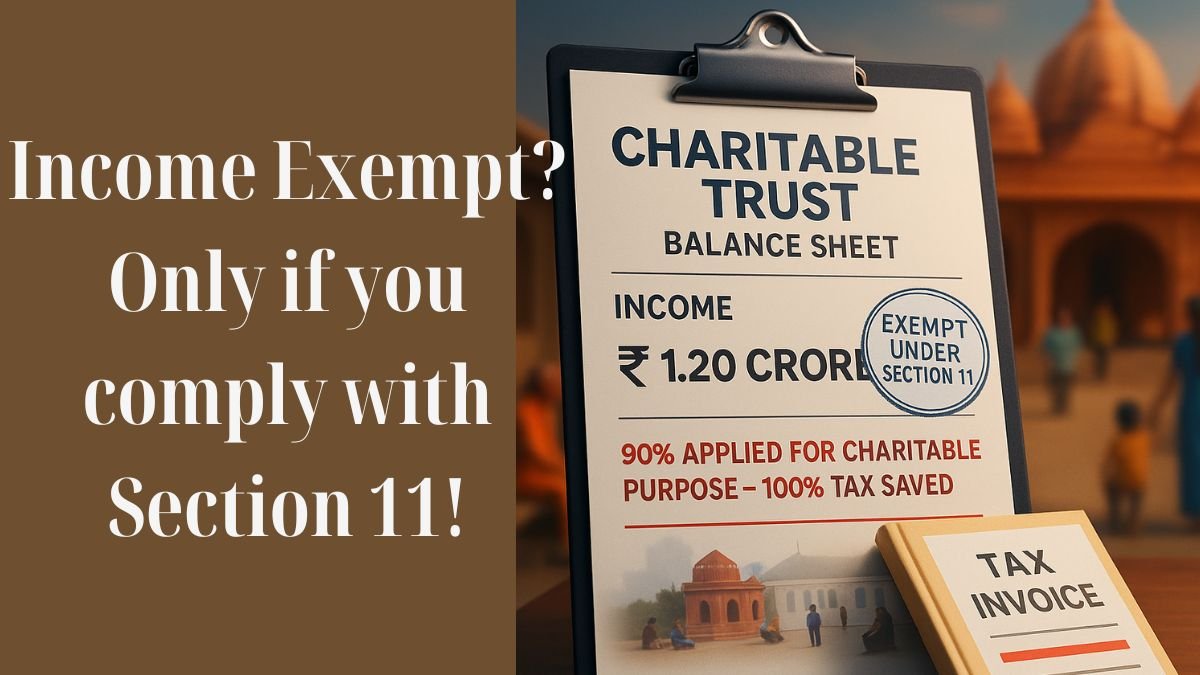
The Income Tax Act, 1961, provides various exemptions for charitable institutions and religious trusts. Among the most significant provisions is Section 11 of the Income Tax Act, which focuses on the income from property held for charitable or religious purposes. This section acts as a key relief measure for non-profit organisations, allowing them to utilise their income effectively without the burden of taxation, provided they comply with certain conditions.
🔍 What is Section 11 of the Income Tax Act?
Section 11 of the Income Tax Act, 1961 offers exemptions on any income that charitable trusts earn from any property held under their name. The term ‘property’ here isn’t limited to physical land or buildings. It includes movable assets like investments & cash deposits as well.
The exemption under Section 11 of the Income Tax Act applies when the income is derived specifically for charitable or religious purposes. That means the income should be applied only for the objects mentioned in the trust deed or the institution's registration document. "
📌 Eligibility: Who Can Avail?
The section applies to institutions that are:
- Registered under Section 12AA or 12AB of the Act.
- Established wholly for charitable or religious purposes.
- Applying 85% or more of their income for such purposes in India during the financial year.
If these conditions are met, the income from property held for charitable or religious purposes qualifies for exemption. "
💼 Accumulation up to 15% of Income Under Section 11(1)
One of the most beneficial clauses in Section 11(1) is the accumulation of income up to 15%. This means charitable institutions are allowed to set aside up to 15% of their income for future use, without losing tax benefits.
Let’s say a trust earns ₹10,00,000 in a financial year. If ₹8,50,000 is used for charitable or religious activities, the remaining ₹1,50,000 (15%) can be accumulated for future application, & still be exempt under Section 11 of the Income Tax Act.
🧾 Conditions to Claim Exemption Under Section 11
- Proper Books of Account must be maintained.
- Returns must be filed on time as per Section 139(4A).
- Funds must be invested only in modes specified under Section 11(5).
- The trust must not engage in any commercial activity unless incidental to its objectives and separately accounted.
📘 Sub-Sections and Clauses to Know
- Sub-section (4) deals with business income derived from properties held under the trust.
- Sub-section (5) restricts the types of investments the trust can hold.
- Clause (2) of Explanation 1 to Sub-section (1) allows the accumulation of income for specific projects, subject to certain conditions.
🧾 Example to Understand Section 11 Better
Suppose a charitable trust owns a school and earns rental income from its building. The income is spent entirely on free education for underprivileged students. As long as the trust is registered and meets all compliance requirements, this rental income will be exempt under Section 11 of the Income Tax Act.
👤 Legal Competence and Applicability
Every person is competent to contract who is of the age of majority is competent to contract, & this applies to trustees managing the property. It's also important to remember that the amendment to Section 11 of the Income Tax Act now brings more scrutiny and reporting requirements, especially post the Finance Act, 2023.
Some sub-rules discuss applicability for different categories:
- For companies other than companies claiming exemption under Section 11 of the Income Tax Act
- For trusts and NGOs, including educational and medical institutions
🔄 Amendment in Section 11 of the Income Tax Act
The amendment in Section 11 of the Income Tax Act was aimed at improving transparency. Now, trusts must furnish audit reports & file returns within the due date. Additionally, the exemption is withdrawn if funds are misapplied or diverted.
✅ Final Words
Section 11 of the Income Tax Act, 1961, is a lifeline for India’s charitable ecosystem. It empowers trusts and religious institutions by offering exemptions on income earned from properties, provided that the income is applied toward noble causes. While the compliance has tightened over the years, the section remains generous for genuine institutions committed to public welfare.
Whether you are setting up a charitable trust or managing one, understanding Section 11 of the Income Tax Act with examples is critical to ensuring lawful and efficient operations.











